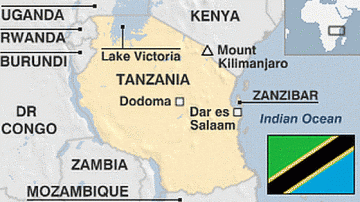Tanzania's economy shows solid growth in second quarter
 Stronger mining, manufacturing and energy sectors helped Tanzania's economic growth by 7.9 percent in the second quarter of 2016.
Stronger mining, manufacturing and energy sectors helped Tanzania's economic growth by 7.9 percent in the second quarter of 2016.
Dar es Salaam - Stronger mining, manufacturing and energy sectors nudged Tanzania's economic growth forward at a brisker pace in the second quarter of 2016.
Tanzania, the second largest economy in the East Africa, grew 7.9 percent in the second quarter of 2016, compared to 5.8 percent during the same time last year, the state-run National Bureau of Statistics said on Thursday.
"The growth of GDP in the second quarter was driven by mining, manufacturing and energy sectors," Albina Chuwa, the director general of the bureau, told a news conference.
"The increased production of natural gas has significantly boosted electricity generation in the country."
Tanzania's growth in the first quarter was 5.5 percent.
The central bank said country's current account deficit had narrowed 56.6 percent in the year to June, helped by a fall in oil imports and boosted by mining, tourism and manufacturing.
Imports of goods and services fell 15.2 percent to $11.33 billion, while total exports rose to $10.09 billion from $9.3 billion previously, it said.
Earnings from an increasing number of tourists - the east African country's main source of foreign currency - rose to $2.27 billion from $2.19 billion previously, the bank said.
Exports of manufactured goods fetched $1.46 billion, up from $1.31 billion in the same period last year, while oil imports fell to $2.8 billion from $3.06 billion a year ago, in line with falling import volumes and declining global oil prices.
"Tanzania's economic growth has received a boost from massive investments being made by President John Magufuli's government in infrastructure projects," said Humphrey Moshi, a professor of economics at the University of Dar es Salaam.
The central bank says it expects the economy to grow 7.2 percent in 2016, up from 7 percent in 2015, helped by construction, an anti-corruption drive and better management of public resources.
Moshi said the country will probably meet that target growth rate but needs to broaden its areas of investment to ensure more people benefit.
"The government is investing heavily to build new roads, railway networks, ports and power plants, and this will in turn help to improve the business environment and spur faster economic growth ... by attracting more foreign direct investment," he said.
"The state faces the challenge of improving irrigation infrastructure to boost yields because our agriculture relies on rainfall, which has become unreliable due to climate change," he added.
Tanzania is Africa's fourth-largest gold producer and also has deposits of coal, diamonds, uranium and gemstones.
Its also home to two renowned tourism destinations - Africa's highest mountain, Kilimanjaro, and wildlife-rich national parks such as the Serengeti - but has become a target for poachers.
Most Popular
Watch: A Credible Market, the need for Standards in Property Industry
Valuation standards have a significant role to play in helping to regulate professional practice at national, regional and global levels, promoting professional ethics, integrity, impartiality and trust in valuer activities in the property industry. ... Full story










![[Modern Nairobi Skyline] Kenya really is at the cutting edge for African listed property markets. And more REITs are expected to list on the Nairobi Stock Exchange going forward. [Modern Nairobi Skyline] Kenya really is at the cutting edge for African listed property markets. And more REITs are expected to list on the Nairobi Stock Exchange going forward.](https://www.africapropertynews.com/thumbnail.php?file=articles/nairobi_kenya_skyline_275707842.jpg&size=summary_large)
